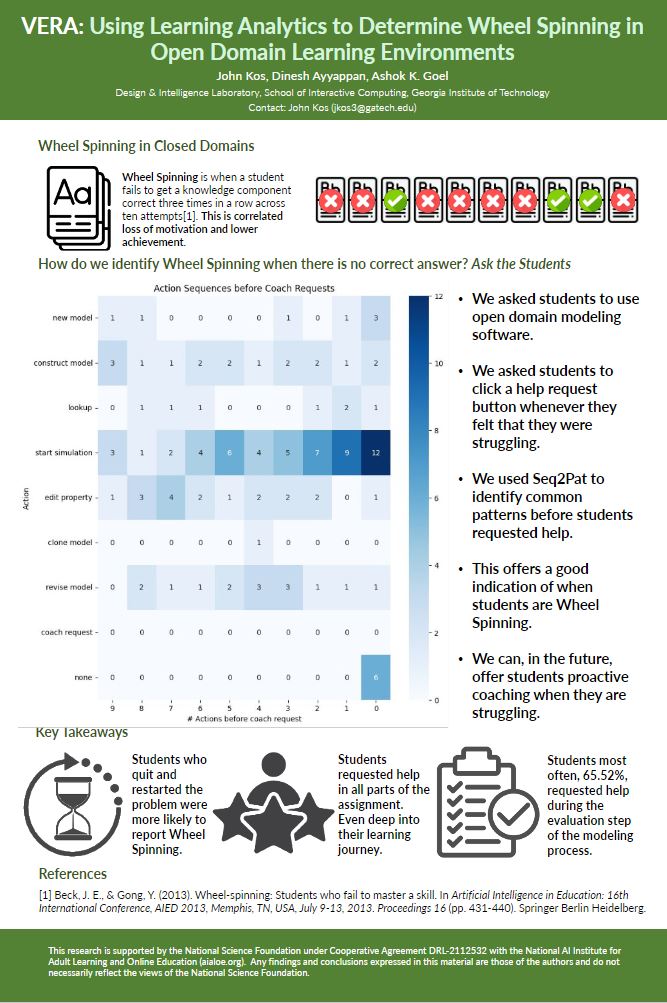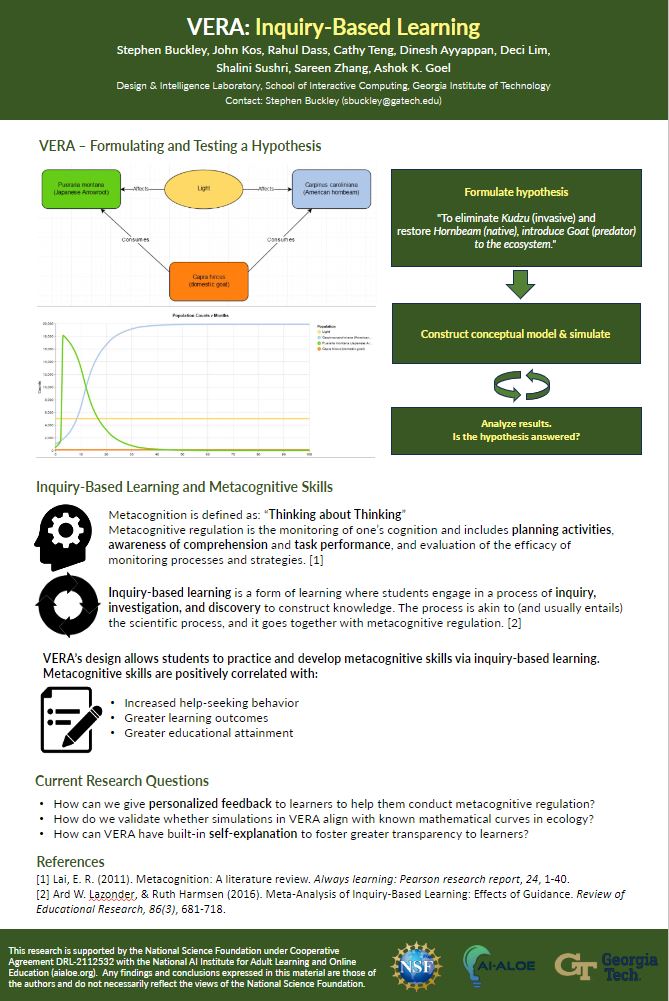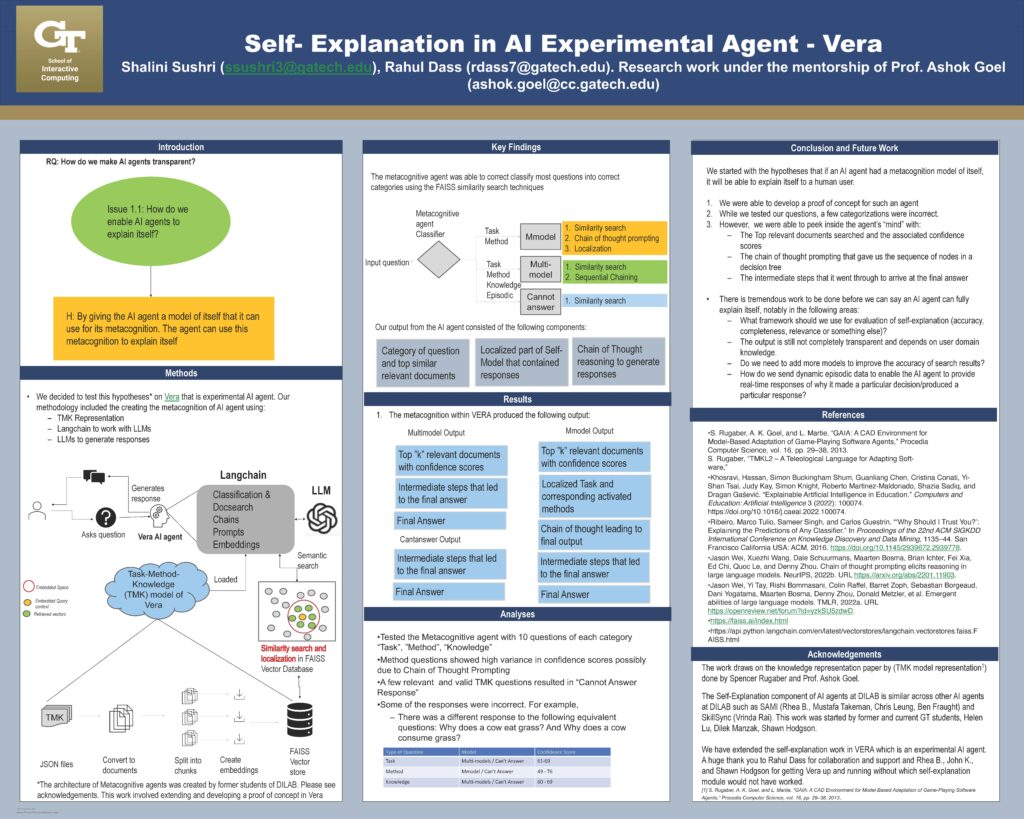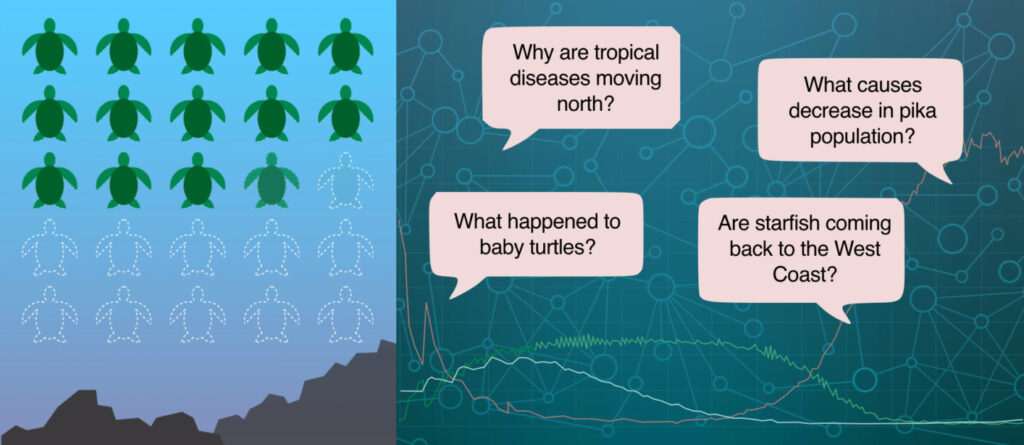The Virtual Experimental Research Assistant, or VERA, is an online interactive learning environment developed by the Design Intelligence Lab at Georgia Tech which enables users to design conceptual models of complex systems that can be validated using simulation. VERA’s current primary function is to enable active learning and inquiry-based learning of ecological models and systems. For example, a user might construct predator-prey cycles to understand how different species’ populations fluctuate over time based on their characteristics. VERA’s audience includes undergraduate and graduate Biology, Ecology and Computer Science students at Georgia Tech, technical college students at NGTC and citizen scientists.
Current VERA research interests include (1) analyzing user modeling and metacognitive behaviors in the context of open-ended, ill-defined domains, (2) developing metacognitive coaches that give personalized feedback to users, and (3) developing a self-explanation agent to answer questions about VERA’s internal processes to foster greater transparency and trustworthiness.

VERA: Using Learning Analytics to Determine Wheel Spinning in Open Domain Learning Environments
Kos, J., Ayyappan D., and Goel, A. K. (2024) VERA: Using Learning Analytics to Determine Wheel Spinning in Open Domain Learning Environments. AI-ALOE Showcase, Georgia Tech.

VERA: Inquiry-Based Learning
Buckley, S., Kos, J., Dass, R., Teng, C., Ayyappan, D., Lim, D., Sushri, S., Shang, S., and Goel, A. K. (2024) VERA: Inquiry-Based Learning. AI for Lifetime Learning Symposium, Georgia Tech.

Self- Explanation in AI Experimental Agent – Vera
Researchers: Sungeun An, Scott Bunin, Stephen Buckley, Willventchy Celestin, Andrew Hornback, Vrinda Nandan, Spencer Rugaber, Ashok Goel

VERA: Virtual Ecological Research Assistant
The Virtual Ecological Research Assistant (VERA) is developed by the Design & Intelligence Lab at Georgia Tech, in collaboration with Smithsonian’s Encyclopedia of Life Department. The VERA system leverages AI technologies like Natural Language Processing (NLP) and AI compiler to support cognitive aspects of learning such as inquiry-based learning and model-based reasoning.
VERA enables users to construct conceptual models of ecological systems and run interactive model simulations. This allows users to explore ecological systems and perform “what if” experiments to either explain an existing ecological system or attempt to predict the outcome of future changes to one.
Figure 1 shows a conceptual model of a food web that involves cougars (Puma concolor) mule deer (Odocoileus hemionus), domestic horses (equus caballus), and cat grass (dactylis glomerata) (base population) generated from VERA.

Figure 1. Conceptual model of the relationships between species.
Figure 2 shows a simulation result generated from the conceptual model in Figure 1. In the simulation graph, you will see how the populations change over time in relationship to one-another. In particular, you will notice a stable predator-prey cycle between cougar (orange line) and mule deer (light blue line); that is, the cycles crest and fall in one after the other.

Figure 2. Simulation result when running the model from Fig. 1
Jill Watson, the AI-enabled virtual teaching assistant (TA), answers user questions about VERA. The covered questions include technical questions about the tool – “How do I add a new project” – as well as subject matter questions – “What is consumption rate?”
Please visit http://vera.cc.gatech.edu to sign up (with your GT account) and start exploring VERA.
VERA-Epi (Epidemiology)
The VERA team modeled the impact of social distancing on the spread of COVID-19. The simulations show that practice of social distancing slows the spread of COVID-19 (“flattens the curve”).
With VERA, you can explore parameter values and see for yourself the flattening of the curve. Interested in learning more? Visit VERA-Epi or read the white paper.
Recent News
- Four DILab Papers Accepted for Presentation!
- SPECIAL ISSUE: AI Magazine: NSF’s National AI Institutes
- New Publication: Explanation as Question Answering Based on User Guides
- New Publication: Machine Teaching for Building Modular AI Agents based on Zero-shot Learners
- Chelsea Wang: Theory of Mind on Human-AI Interaction